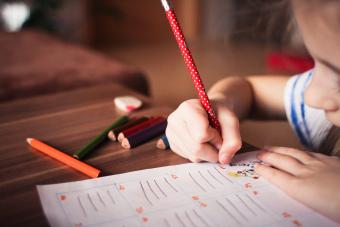
English is nothing if not a descriptive language. It's full of adjectives to describe everything from how tall you are to the color of a backpack. Whether you're a parent, teacher, or even a student looking for a list of adjectives for kids, you can find plenty of examples here. Find types of adjectives kids might learn at different age levels to make their writing and vocabulary more colorful. You'll also get a printable to keep handy, along with tips on how to teach adjectives and make it fun.
What Is an Adjective?
Words that describe people, places, and things, or nouns, are called adjectives. You can remember this by thinking "an adjective adds something." But what's a descriptive adjective? Let's break it down.
- A descriptive adjective is one of the three main types of adjectives.
- Descriptive adjectives, or describing words, give details about a subject.
- Descriptive adjectives can help you understand how something looks, how many there are, what size it is, or what it's made of.
Having a clear definition of adjectives for kids is only the beginning. Now, it's time to break descriptive adjectives down.
Examples of Descriptive Adjectives for Kids
Having an extensive list of descriptive adjectives handy can help kids improve their vocabulary skills, whether they are at home or at school. You can look at a list of adjectives to see how some are describing words and others tell you different details about a noun. You'll also notice that some are simple and some are compound (like itsy-bitsy).
Adjectives to Describe a Person's Appearance
A world without descriptive adjectives would be very bland indeed, especially if you are trying to describe an adult or child. You can use descriptive adjectives to give details about their appearance, size, or age.
| Looks | Size | Age |
|---|---|---|
| Adorable | Average | Ancient |
| Attractive | Buff | Baby-faced |
| Beautiful | Curvy | Elderly |
| Cute | Fit | Mature |
| Gorgeous | Petite | Modern |
| Handsome | Tall | Old |
| Hot | Short | Senior |
| Lovely | Skinny | Young |
| Picture-perfect | Slim | Youthful |
Descriptive Adjectives for Size
If you're describing a building, animal, or object, giving details about exactly what size your subject is will make your writing come alive.
| Big | Small | Shape |
|---|---|---|
| Colossal | Baby | Broad |
| Enormous | Itty-bitty | Circular |
| Gargantuan | Little | Curved |
| Giant | Mini | Deep |
| Gigantic | Miniature | Flat |
| Huge | Petite | Hollow |
| Humongous | Teensy | Narrow |
| Large | Teeny | Square |
| Massive | Tiny | Straight |
| Tremendous | Wee | Triangular |
Adjectives to Describe Personality Traits
Whether it's how an animal or a person is acting, descriptive adjectives about personalities can be fun and useful. For example, you can say your brother has a bold attitude or your mom is a clever crafter.
| Adaptable | Adventurous | Affectionate |
| Aggressive | Artistic | Athletic |
| Bold | Brave | Calm |
| Cheerful | Confident | Clever |
| Determined | Eager | Faithful |
| Friendly | Generous | Helpful |
| Lively | Loving | Patient |
| Practical | Relaxed | Sociable |
| Thoughtful | Trustworthy | Understanding |
| Wild | Willing | Zany |
Adjectives to Describe Emotions and Feelings
Kids have lots of emotions, and they're often very big feelings. Different emotion words can help you share exactly how you are feeling.
| Angry | Bored | Content |
| Delighted | Disappointed | Exhausted |
| Frustrated | Furious | Glum |
| Joyful | Merry | Sleepy |
| Upset | Weak | Weary |
Positive Descriptive Adjectives for Kids
In a world where you want to be kind and happy, positive describing words can help you be positive too. It's fun for kids to tell their friends how amazing they are. You might even turn that into a lesson for your kiddos to write positive notes about the class using positive descriptive adjectives.
| Acceptable | Agreeable | Amazing |
| Awesome | Cool | Cordial |
| Exceptional | Extraordinary | Fair |
| Impressive | Kind | Likable |
| Memorable | Okay | Outstanding |
| Polite | Rare | Satisfied |
| Sweet | Well | Wonderful |
Descriptive Adjectives by Grade-Level
Not all descriptive adjectives are the same; as children learn and grow, they'll gain more advanced ways to describe things. The vocabulary your child has at four isn't the same as the one they have at ten. Get a quick breakdown of some common adjectives found in early elementary, upper elementary, and middle school.
Early Elementary Descriptive Adjectives
Preschoolers and kindergarteners are just learning how to define themselves, their peers, and the world around them. The descriptive adjectives they learn include color, size, shape, texture, and weather.
| Busy | Black | Blue |
| Cloudy | Dark | Green |
| Loud | Rough | Round |
| Small | Soft | Thin |
Elementary Descriptive Adjectives
Older elementary students have a better grip on their describing words. They are working to expand their vocabulary to include more complex words, like compound and proper descriptive adjectives.
| Alive | American | English |
| Fluffy | Left-handed | Proud |
| Rainy | Sane | Simple |
| Spoiled | Sticky | Sure-footed |
Middle School Descriptive Adjectives
By the time students reach the middle school level, it's all about expanding their vocabulary to make their writing more colorful and incorporating figurative language.
| Curious | Adventurous | Scalding |
| Comely | Exquisite | Graceful |
| Melodic | Minuscule | Superior |
| Swift | Tactful | Tremendous |
Printable List of Adjectives
Keeping a printable list of adjectives handy can help kids find new words to use during writing lessons or creative writing time. This list features nine categories that cover common adjectives, such as words describing feelings and words describing size. Click on the image of the list to download and print it.
Descriptive Adjective Teaching Tips
Learning adjectives can be a challenge for kids. Looking for creative ways to share adjective examples to make the most of these grammar lessons can make it more fun and engaging.
- Buy or print flash cards with descriptive adjectives on them. Hold up a picture of a person, animal, or other noun and let kids sort through the pile of cards to find a great describing word for that picture.
- After a child writes a paragraph or short story, circle all their adjectives and challenge them to come up with new adjectives to use in place of the circled ones.
- Use mad lib style writing activity to help kids explore a variety of adjectives with humor.
- Encourage kids to combine adjectives when describing items like saying "the adorable brown dog" instead of just "the dog."
- Teach your child to use a thesaurus or kid's dictionary to liven up their writing and keep lists of new adjectives they discover.
- You can also try banning certain generic adjectives to help your child be creative in making their writing more lively.
Describe in Detail
Writing in elementary school is important because kids really build their own vocabulary and writing style. Each descriptive adjective means something very specific, and kids can explore lists of words to find the right adjective to use at the moment. Using descriptive adjectives also just makes writing more fun!







